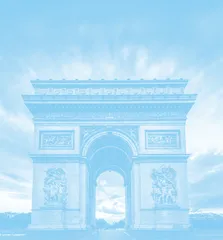Paris! City of the Arts巴黎!文艺之都
作者: 保罗·鲍尔斯 罗怀宇/译介

【导读】 保罗·鲍尔斯(1910—1999)是美国作曲家、作家、翻译家和旅行家,被认为对20世纪美国文学和音乐都做出过贡献。鲍尔斯爱好旅行,目的地集中在欧洲、北非、墨西哥和南美,他撰写的游记见诸各类报刊。1947年,鲍尔斯开始在摩洛哥港口城市丹吉尔(Tangier)定居,直到去世。在中国,他较为人知的小说包括《遮蔽的天空》(The Sheltering Sky)。“巴黎!文艺之都”一文最初发表在1953年4月的《假日》杂志上,2010年以鲍尔斯名义结集出版的Travels: Collected Writings, 1950—93收录了这篇文章。
选译部分是这篇文章的开头。定居丹吉尔后的鲍尔斯以一种另类视角追忆自己游历巴黎的“十七岁的年华”,不事雕琢,却极好地摹画了巴黎独特的气质。作者没有将重点放在巴黎无处不在、人尽皆知的名胜古迹,而在聚焦时代变迁中巴黎艺术家的生活,有选择地提及一些文人墨客及地名,以经济的笔墨勾勒出巴黎文艺之都的特质;艺术家们从传统“波西米亚式生活”到美其名曰“回归乡土”运动的变迁,烘托出这座文艺之都的岁月沧桑感。
Particularly I remember the winters in Paris—not with pleasure, not with displeasure—just the blank impressions, meaningless but powerful, of the hushed, intense cold that lay over the Seine in the early morning, the lavender-gray daylight that filtered down from the damp sky at noon; even on clear days the useless, impossibly distant, small sun up there above. I remember arranging my walks home from work so that I would get to the Tuileries1 in the wistful dimness of twilight.
我尤其记得巴黎的冬天,并非带着愉快,也并非不愉快,只是些平平淡淡的印象,虽无特别含意,却挥之不去。我记得清晨笼罩在塞纳河上肃穆、凛冽的寒气,午间从潮湿的天空滤下的带薰衣草灰的日光;即使晴朗的日子,天空中小小的太阳也太过遥远,毫无暖意。我记得自己刻意安排下班回家的步行路线,只为在那片令人惆怅的苍茫暮色中走到杜乐丽花园。
To be seventeen and in Paris, free to do as one liked—that was an ideal state of affairs for any aspiring artist or writer a generation ago. It was ideal even without money. Perhaps especially without money. If you had money you were somewhat suspect, since it was almost an axiom that money and artistic ability could not belong to the same person; in that case, therefore, you were expected to help keep alive those who had only artistic ability.
在十七岁的年华置身巴黎,自由自在地做自己想做的事——这是上一代任何一个有追求的艺术家或作家梦寐以求的理想状态。哪怕一文不名,也十分理想,或许还尤为理想。若是颇有资财,反而会招致某种质疑,因为那时有个观念几乎被奉为至理,那就是人不能同时拥有金钱和艺术才华;所以,如果你有钱,人们便会认为你应该帮助养活那些只有艺术才华的人。
But at seventeen one has energy: one can walk a few miles to save bus fare, one can run up six or seven flights to a room under the roof, one can live on a meal a day if one is not working, by staying in bed most of the time and eating bread. I went for months without a bath, washed my own clothes, was gnawed by bedbugs every night, and put up with a hundred inconveniences (any one of which, had I had to endure it in America, would have been downright hell) and loved it all, because I was in Paris.
但是十七岁的年华有的是精力:可以为了省下公交车钱步行几英里;也可以爬六七段楼梯,回到自己的阁楼蜗居;要是没工作,可以一天只吃一顿,大部分时间待在床上,面包果腹。我曾一连几个月没洗过澡,自己动手洗衣服,每天夜里被臭虫叮咬,忍受着千般不便(换作在美国,任何一种都是绝对无法忍受的)却仍乐在其中,因为我是在巴黎。
I suppose it was because I felt that everybody was there. I was sharing the town with them all. Picasso was just going into his rag, bone and hank-of-hair2 period; Gertrude Stein was busily preparing to publish her own works in the Plain Edition3; Stravinsky was writing the Symphonie des Psaumes; Joyce was in the middle of his Work in Progress4; Diaghilev was there with his magnificent troupe5. Then, too, it seemed to me that the struggles and scandals that went on in the art world there were of supreme importance: in a way it was like living within sight of the front during a war in whose outcome you were vitally interested. The Surrealists were regularly staging pitched battle in their own night clubs: the presence of a few policemen was almost a necessity at any artistic manifestation. It was the culmination of an era of aesthetic violence, in which the basic desire of the creative artist was to shock.
我寻思,这可能是因为我觉得大小人物都生活在那里。我是在和他们所有人分享这座城市。毕加索正要进入他衣衫褴褛、形容枯槁、不修边幅的时期;格特鲁德·斯泰因正在紧张筹备自费刊行她的作品;斯特拉文斯基正在谱写他的《诗篇交响曲》;乔伊斯正在创作他的《进行中的作品》;达基列夫在那里创建了阵容华丽的芭蕾舞团。再有,就是巴黎文艺界的各种争斗和丑闻,这些在我看来最为紧要:某种程度上,这就像战时住在一个睁眼能看见前线的地方,你因事关生死而对战争结局很是忧心。在属于他们的夜店里,超现实主义者定期上演着激战:任何一场艺术展示几乎都会有几个警察坐镇。那是暴力美学的巅峰时代,震撼是创意艺术家们的基本动机。
For artists, would-be artists and those numberless people for whom association with art of some sort, and with those who practice it, is a necessity, Paris is much more than a splendid city of boulevards, cafés, shops, bright night spots, parks, museums and historical monuments. It is a complete continent in itself, every region of which must be explored on foot. I wonder how many thousands of miles I myself must have covered, walking in the streets there, from the Bois de Vincennes6 to the Buttes-Chaumont7, from Auteuil8 to Charenton9, always seeking to penetrate, understand, participate in the sense of mystery that enveloped the city, looking for lost quarters that nobody knew, unearthing strange little alleys that were like nothing I had ever seen before, and many of which still remain intact as images in my mind’s eye. Infinite variety in a harmonious whole, the certainty of discovering something new and poignant each day—such things give the artist who lives in Paris a sense of satisfaction and spiritual well-being. I think it is they, rather than the more tangible benefits Paris provides, that make it the principal gathering place for artists from every part of the world.
对于艺术家、潜在艺术家以及无数必须与某种艺术或艺术工作者建立联系的人,巴黎远不止是一座由大道、咖啡馆、商店、灯火通明的夜总会、公园、博物馆和古迹组成的富丽堂皇的城市。它本身就是一块完整的大陆,每一个地方都必须用脚步去丈量。我不知道,在巴黎的街道上我到底走过几千英里路程了,从万塞讷森林到肖蒙山丘公园,从欧特伊到沙朗通,我一直试图穿透、理解和融入笼罩着这座城市的神秘感,找寻不为人知的失落之所,发掘前所未见的新奇巷弄,其中的许多仍历历在目。无穷无尽的多样性融汇成一个和谐的整体,每一天必能发现直击灵魂的新意——正是这些赋予了住在巴黎的艺术家一种满足感和精神上的幸福。我认为,也正是这些,而不是巴黎提供的那些更具体的福利,使巴黎成为全世界艺术家的重要聚集地。
In the past those tangible benefits have doubtless been greater than they are today. There was a time when it seemed as though the entire Left Bank existed primarily for the artist. He was the one who was at home there, the rhythm of life was set by him, and the hotel rooms, cafés and restaurants were accessible to him for a sum he could usually manage to raise. Not so today, with food prices at astronomical levels, and Paris in the grip of one of the worst housing shortages in Europe. Now the average artist’s life has little in common with the traditional vie de bohème of the attic studio lit by a candle stuck into a wine bottle. It used to be shabby; now it is grim. The studios are not for him; they have been moved into long since by prosperous bourgeois10 who consider it chic to live in places with an “artistic” atmosphere. Even the servants’ rooms at the tops of the apartment houses are too expensive for him. He is literally being forced from the center of Paris out into the slums, and his life has become pretty desperate. When he eats he cooks the food himself in his tiny room, and he often has to carry his water up several flights in a pail from the tap in the courtyard below.